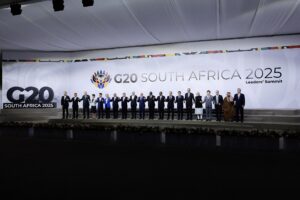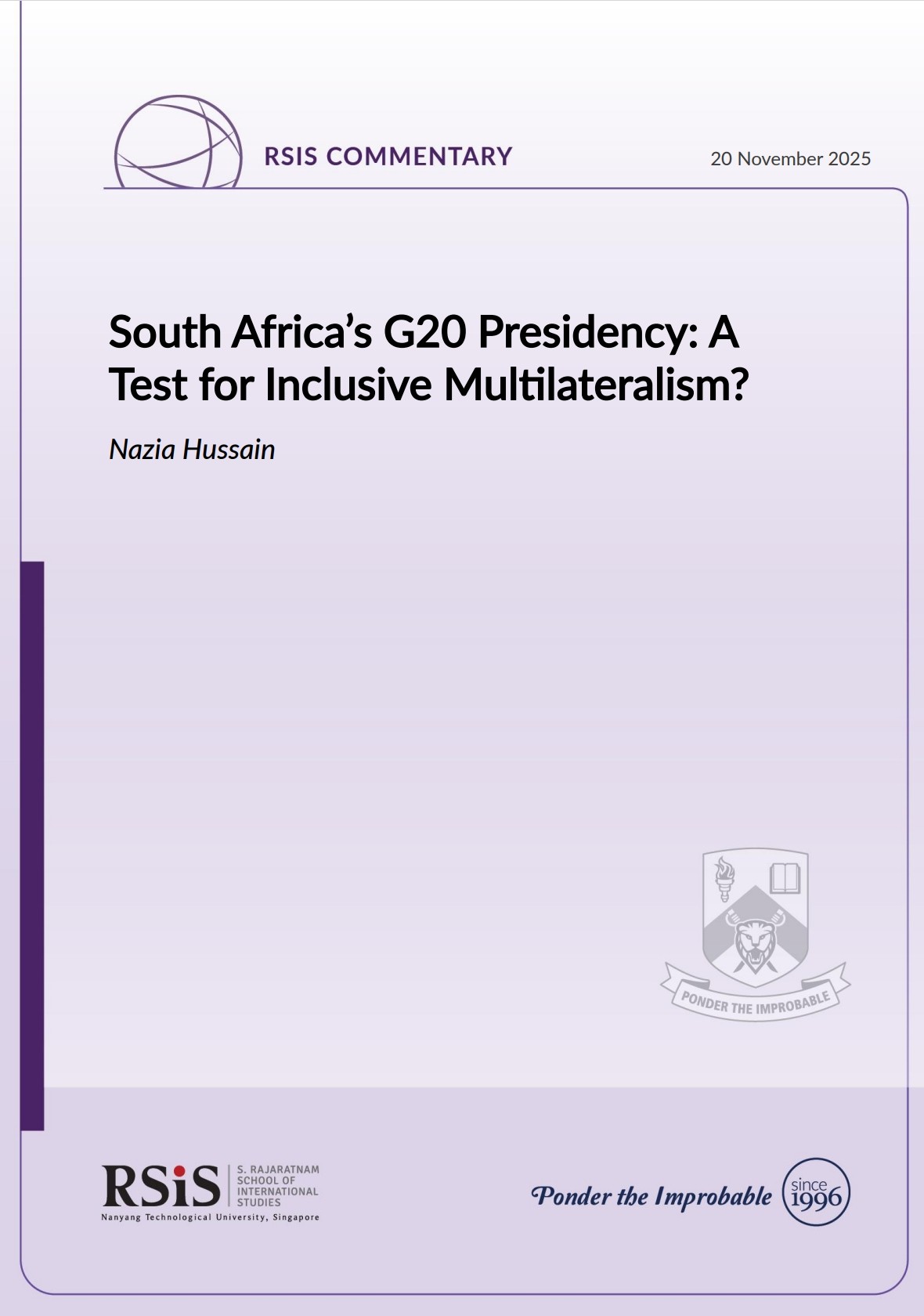20 November 2025
- RSIS
- Publication
- RSIS Publications
- South Africa’s G20 Presidency: A Test for Inclusive Multilateralism?
SYNOPSIS
As South Africa becomes the first African nation to host the G20 Summit, the focus has turned to whether its presidency can convert Global South momentum into tangible and sustainable development reform.

COMMENTARY
When world leaders gather in Johannesburg this week for the G20 Summit, it will mark a significant moment for both South Africa and the Global South. As the first G20 meeting to be held on African soil, the summit carries symbolic and strategic weight, positioning South Africa to put the continent’s priorities — and those of developing economies more broadly — at the centre of international deliberations.
Held under the theme “Solidarity, Equality, Sustainability,” South Africa’s presidency has driven an unmistakeably “Global South” agenda, focusing on priorities such as debt relief, inclusive growth, digital transformation and sustainable development. South African leaders have argued that without addressing systemic disparities in access to finance, technology, and opportunities, global growth will remain fragile, and inequality will continue to pose a systemic risk to economic stability.
Consolidating the Global South Agenda
South Africa’s presidency marks the culmination of a four-year run of Global South leadership of the G20, following Indonesia (2022), India (2023), and Brazil (2024). Each of these presidencies strove for developing economies to shape the global policy agenda, albeit through different strategic emphases.
Indonesia prioritised post-COVID pandemic recovery and supply-chain resilience, India advanced the concept of Digital Public Infrastructure (DPI) as a public good capable of bridging development gaps rapidly and at-scale, while Brazil underscored the link between equity and innovation through its focus on social sustainability and AI governance. Altogether, these presidencies have reshaped the G20’s discourse, moving it beyond growth-centric debates towards a more reform-oriented vision of inclusive global governance — one that recognises development, digital transformation, and social equity as mutually reinforcing pillars of long-term resilience.
South Africa inherits this momentum at a fractured moment for multilateralism as rising protectionism and unilateralism continue to erode the credibility of global institutions. The G20, nevertheless, remains a consequential forum for shaping global policy on trade and reform norms, accounting for 85 percent of global GDP, over 75 percent of international trade, and two-thirds of the world’s population. In a fragmented geopolitical space, South Africa’s G20 presidency seeks to focus on consolidating the progress of its Global South predecessors to ensure continuity while embedding them within Africa’s development priorities.
Shaping a Digital Architecture
South Africa has positioned digital transformation as a core pillar of its G20 presidency. Expanding upon India’s DPI blueprint, South Africa has introduced institutional tools that link digital investment with public value creation. The Public Value Measurement Framework provides a mechanism for evaluating the social and economic impact of digital investments. Complementing this, the Guidelines for Integrated Governance was developed to support countries in designing transparent and accountable DPI governance frameworks.
To embed digital inclusion as a core development principle, South Africa launched the Global Call for Digital Public Infrastructure Innovations, a platform for governments to exchange practical models for digital ID systems, e-health, e-learning, and digital literacy. The presidency also introduced the Universal and Equitable Digital Inclusion Framework — a policy toolkit that would help governments identify access gaps, design effective interventions, and monitor implementation.
The African context gives these digital initiatives sharper developmental relevance. Across the continent, micro-, small-, and medium-sized enterprises (MSMEs) form the backbone of local economies, accounting for nearly 90 percent of the private sector, employing around 80 percent of the workforce and contributing 40 percent of GDP—with roughly 70 percent of these enterprises being women-owned or informal. Yet, many of these businesses, particularly women-owned and informal enterprises, remain excluded from formal markets and financial systems. DPI, by expanding access to digital identification, payment systems, and e-services, is intended to empower MSMEs through improved operational efficiency, credit access, and market integration. If implemented effectively, it could transform Africa’s informal economy into a driver of structural growth.
Collectively, South Africa’s initiatives put forward by its digital economy working group mark a strategic evolution in the Global South’s digital diplomacy from adopting digital technologies to shaping the global rules and standards that govern them. By framing digital inclusion as both an economic imperative and a normative agenda, South Africa’s presidency highlights that technological empowerment must be aligned with equity, access, and institutional accountability. However, the question is whether G20 partners and multilateral development banks can incorporate these inclusive principles into their financing models, regulatory frameworks, and political commitments across member states.
Delivering on Global South Leadership?
As South Africa gears up for the summit, the decision by US President Donald Trump to skip attendance despite Washington’s upcoming G20 presidency in 2026, casts a shadow over proceedings and exposes the US’ waning appetite for inclusive multilateralism.
If the Johannesburg Summit manages to secure a joint statement, a feat that eluded the G7 earlier this year, it would reaffirm the G20’s relevance as a platform capable of bridging the Global North–South divides. More importantly, it would signal that inclusive multilateralism, though strained, remains viable when anchored in shared developmental priorities. For Pretoria, the challenge lies in balancing an ambitious developmental agenda while avoiding overreach in a divided geopolitical environment.
About the Author
Nazia Hussain is an Associate Research Fellow in the Centre for Multilateralism Studies (CMS) at the S. Rajaratnam School of International Studies (RSIS), Nanyang Technological University, Singapore (NTU).
SYNOPSIS
As South Africa becomes the first African nation to host the G20 Summit, the focus has turned to whether its presidency can convert Global South momentum into tangible and sustainable development reform.

COMMENTARY
When world leaders gather in Johannesburg this week for the G20 Summit, it will mark a significant moment for both South Africa and the Global South. As the first G20 meeting to be held on African soil, the summit carries symbolic and strategic weight, positioning South Africa to put the continent’s priorities — and those of developing economies more broadly — at the centre of international deliberations.
Held under the theme “Solidarity, Equality, Sustainability,” South Africa’s presidency has driven an unmistakeably “Global South” agenda, focusing on priorities such as debt relief, inclusive growth, digital transformation and sustainable development. South African leaders have argued that without addressing systemic disparities in access to finance, technology, and opportunities, global growth will remain fragile, and inequality will continue to pose a systemic risk to economic stability.
Consolidating the Global South Agenda
South Africa’s presidency marks the culmination of a four-year run of Global South leadership of the G20, following Indonesia (2022), India (2023), and Brazil (2024). Each of these presidencies strove for developing economies to shape the global policy agenda, albeit through different strategic emphases.
Indonesia prioritised post-COVID pandemic recovery and supply-chain resilience, India advanced the concept of Digital Public Infrastructure (DPI) as a public good capable of bridging development gaps rapidly and at-scale, while Brazil underscored the link between equity and innovation through its focus on social sustainability and AI governance. Altogether, these presidencies have reshaped the G20’s discourse, moving it beyond growth-centric debates towards a more reform-oriented vision of inclusive global governance — one that recognises development, digital transformation, and social equity as mutually reinforcing pillars of long-term resilience.
South Africa inherits this momentum at a fractured moment for multilateralism as rising protectionism and unilateralism continue to erode the credibility of global institutions. The G20, nevertheless, remains a consequential forum for shaping global policy on trade and reform norms, accounting for 85 percent of global GDP, over 75 percent of international trade, and two-thirds of the world’s population. In a fragmented geopolitical space, South Africa’s G20 presidency seeks to focus on consolidating the progress of its Global South predecessors to ensure continuity while embedding them within Africa’s development priorities.
Shaping a Digital Architecture
South Africa has positioned digital transformation as a core pillar of its G20 presidency. Expanding upon India’s DPI blueprint, South Africa has introduced institutional tools that link digital investment with public value creation. The Public Value Measurement Framework provides a mechanism for evaluating the social and economic impact of digital investments. Complementing this, the Guidelines for Integrated Governance was developed to support countries in designing transparent and accountable DPI governance frameworks.
To embed digital inclusion as a core development principle, South Africa launched the Global Call for Digital Public Infrastructure Innovations, a platform for governments to exchange practical models for digital ID systems, e-health, e-learning, and digital literacy. The presidency also introduced the Universal and Equitable Digital Inclusion Framework — a policy toolkit that would help governments identify access gaps, design effective interventions, and monitor implementation.
The African context gives these digital initiatives sharper developmental relevance. Across the continent, micro-, small-, and medium-sized enterprises (MSMEs) form the backbone of local economies, accounting for nearly 90 percent of the private sector, employing around 80 percent of the workforce and contributing 40 percent of GDP—with roughly 70 percent of these enterprises being women-owned or informal. Yet, many of these businesses, particularly women-owned and informal enterprises, remain excluded from formal markets and financial systems. DPI, by expanding access to digital identification, payment systems, and e-services, is intended to empower MSMEs through improved operational efficiency, credit access, and market integration. If implemented effectively, it could transform Africa’s informal economy into a driver of structural growth.
Collectively, South Africa’s initiatives put forward by its digital economy working group mark a strategic evolution in the Global South’s digital diplomacy from adopting digital technologies to shaping the global rules and standards that govern them. By framing digital inclusion as both an economic imperative and a normative agenda, South Africa’s presidency highlights that technological empowerment must be aligned with equity, access, and institutional accountability. However, the question is whether G20 partners and multilateral development banks can incorporate these inclusive principles into their financing models, regulatory frameworks, and political commitments across member states.
Delivering on Global South Leadership?
As South Africa gears up for the summit, the decision by US President Donald Trump to skip attendance despite Washington’s upcoming G20 presidency in 2026, casts a shadow over proceedings and exposes the US’ waning appetite for inclusive multilateralism.
If the Johannesburg Summit manages to secure a joint statement, a feat that eluded the G7 earlier this year, it would reaffirm the G20’s relevance as a platform capable of bridging the Global North–South divides. More importantly, it would signal that inclusive multilateralism, though strained, remains viable when anchored in shared developmental priorities. For Pretoria, the challenge lies in balancing an ambitious developmental agenda while avoiding overreach in a divided geopolitical environment.
About the Author
Nazia Hussain is an Associate Research Fellow in the Centre for Multilateralism Studies (CMS) at the S. Rajaratnam School of International Studies (RSIS), Nanyang Technological University, Singapore (NTU).





